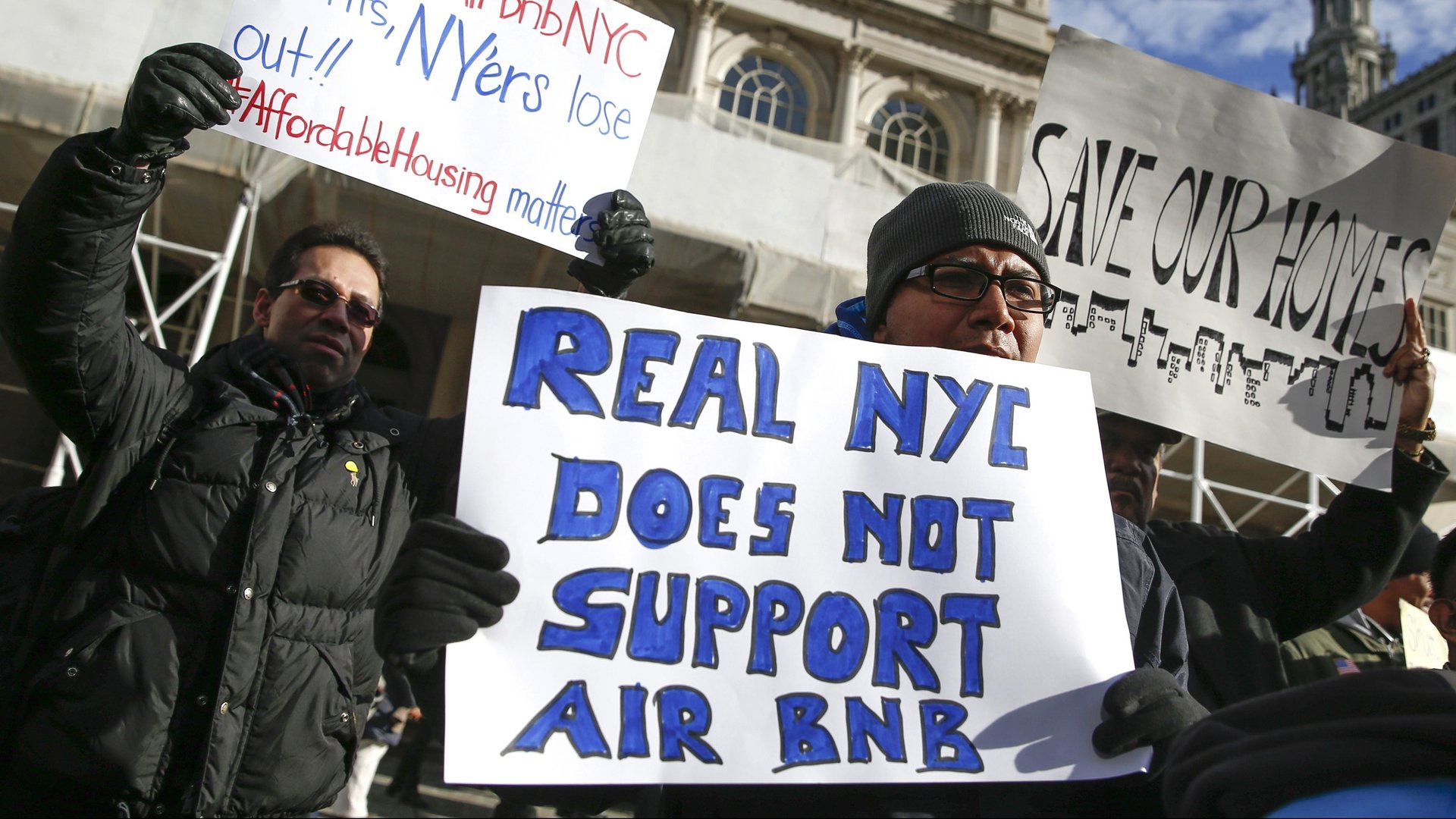New York made it illegal to advertise your apartment on Airbnb for less than 30 days
New York governor Andrew Cuomo today (Oct. 21) signed into law some of the toughest restrictions on short-term apartment rentals in the country, a decision with dire implications for Airbnb.


New York governor Andrew Cuomo today (Oct. 21) signed into law some of the toughest restrictions on short-term apartment rentals in the country, a decision with dire implications for Airbnb.
Under the new rules, which were passed by the state legislature this summer, it is illegal for residents of “Class A” multiple dwellings in New York City—buildings designed for three or more families—to advertise their full home for rent for less than 30 days. (Renting a shared or spare room is perfectly fine). Violators will be fined $1,000 for the first offense, $5,000 for the second, and $7,500 for the third.
The legislation was fought bitterly by Airbnb, the home-sharing company valued at $30 billion. In July, Airbnb poured $1 million into Stronger Neighborhoods, a political action committee created to advocate for its peer-to-peer rentals. The company last month also held a summit for its New York City hosts, where it handed out postcards and encouraged them to write the governor a message “about why you love hosting.”
It was already illegal in New York City to rent out an entire apartment for less than 30 days, but Airbnb built the city into its biggest US market largely by ignoring the rules. The company has repeatedly characterized New York’s illegal hotel law as outdated and refused to help regulators police its bookings. The bill signed today by Cuomo is a workaround. Rather than having to figure out when and where illegal rentals are happening, regulators can now simply watch Airbnb’s site for any listings that break the rules.
“This is an issue that was given careful, deliberate consideration, but ultimately these activities are already expressly prohibited by law,” Cuomo spokesman Rich Azzopardi said.
The bill sets a devastating precedent for Airbnb, whose business is under siege across the US. This June, Airbnb sued its hometown of San Francisco for fining hosts who have failed to comply with regulations that took effect last year, which Airbnb itself helped get passed. In Los Angeles, the city council is moving toward new rules that would legalize some rentals of less than 30 days but also require Airbnb to turn over significant amounts of data. In Miami, Airbnb has spent close to $1 million on a TV ad campaign amid a city crackdown on short-term rentals that has imposed $1.6 million in fines over the last five months.
Airbnb had threatened over the summer to sue should the bill become law, and the company said today it had made good on that, filing claims against the city of New York and state attorney general Eric Schneiderman in federal court. The company has requested a temporary restraining order against the implementation of the bill as well as a formal injunction from a judge.
“In typical fashion, Albany back-room dealing rewarded a special interest—the price-gouging hotel industry—and ignored the voices of tens of thousands of New Yorkers,” Josh Meltzer, Airbnb’s head of public policy for New York, said in an emailed statement. ”We will continue to fight for a smart policy solution that works for the the people, not the powerful.”
Airbnb’s stubborn refusal to comply with apartment regulations in New York has alienated a vast array of special interests, including the hotel industry and unions, affordable housing advocates, and tenants’ rights groups. Those groups cheered the governor’s decision to sign the bill.
“Airbnb thought they could come into New York, break our laws, and bully our leaders like Governor Cuomo and legislators, who have stood up to protect the affordable housing supply for millions of New Yorkers,” Peter Ward, president of the powerful New York Hotel Trades Council, said in a statement. “Today, we see they were wrong.”
Cuomo had until Oct. 29 to sign the bill after it was sent to his desk earlier this week. On Oct. 19, Airbnb proposed cracking down on its own hosts in New York City in a last-ditch attempt to mitigate its situation. In a column in the New York Daily News, the company said it would limit hosts in the city’s five boroughs to renting a single home, a proposal designed to protect the residential housing supply and deter property owners from running illegal hotels. Airbnb also offered to create a hotline for neighbors, who have complained in the past that Airbnb guests disrupt the “quiet enjoyment” of their apartments.
But rather than help Airbnb, the proposals only rankled its political opponents more, who said the company had taken its ideas straight to the press instead of trying to negotiate in good faith.
“In spite of Airbnb’s misleading statements to the contrary, those who want to legally use sites like Airbnb—for example by renting out a spare room while they remain in residence—are still free to do so, as they have always been,” Linda Rosenthal, the assembly member who sponsored the bill, said today. ”Those who are breaking our laws and disrupting their neighbors and communities will now face stiffer penalties.”